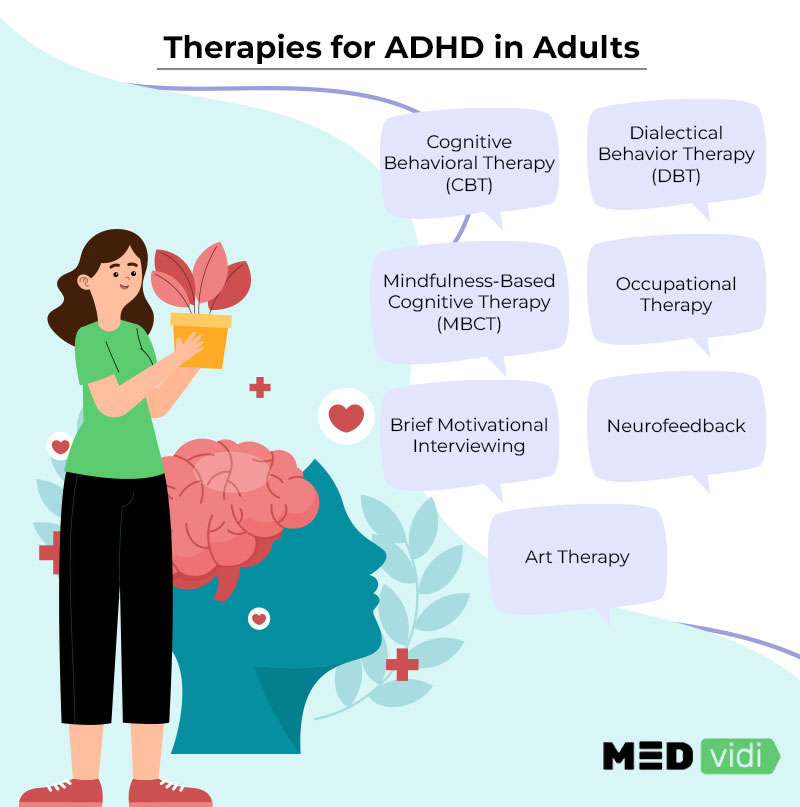ADHD/ADD symptoms can cause a range of behaviors that make performing even simple activities difficult or impossible. Even though medicines are a typical treatment and can reduce ADHD symptoms, it is still vital to address the behaviors and habits. It helps to avoid relapse and improve the overall functioning of the individual.
By organizing time at home, creating consistency and routines, and boosting positive attention, ADHD therapy addresses troublesome behaviors typical of adults with ADHD.
It is essential to look for expert assistance and have the best course of treatment or therapy determined for you. Continue reading to learn more about the top therapies available for adults with ADHD.
How Effective Is Therapy for ADHD?
The most effective way of treating ADHD in adults seems to be a mix of medication, skill development, and counseling. In
Self-esteem and organizational abilities also tend to advance. Patients with ADHD who receive therapy can better cope with stress, learn how to deal with their symptoms, and focus on their abilities. Therapy may significantly improve your quality of life, whether it’s learning how to manage activities, control urges, or learn to accept and appreciate yourself. Therefore, treatment for ADHD aids in teaching new habits and teaching patients how to regularly practice them over time until they become natural and easy.
Therapies for ADHD
CBT, mindfulness-based therapy, and brief motivational interviewing are among the therapies available to adults with ADHD. Adults with ADHD should consider the following options for therapy.
1. Cognitive Behavioral Therapy (CBT)
People who have ADHD experience more frequent and upsetting setbacks in everyday activities, in the workplace, and in social situations. Sometimes, they face so many difficulties that they start to doubt themselves and their abilities. Occasionally, it leads to the development of unpleasant feelings, false beliefs about themselves, and cognitive distortions.
For individuals with ADHD, CBT treatments (with or without drug therapy) have been
- Adults with ADHD who use
- CBT may benefit from:
- Cognitive restructuring (changing the way you think about things)
- Changes in behavior and coping mechanisms (changing the way you react to something)
- Consistency, acceptance, or mindfulness
- Application techniques
2. Mindfulness-Based Cognitive Therapy (MBCT)
Traditional CBT techniques and mindfulness meditation are combined in mindfulness-based cognitive therapy (MBCT). A person’s attention is kept in the present moment when practicing mindfulness, which encourages an open and aware mental state. During mindfulness activities, thoughts and feelings that come up are acknowledged but not critiqued. According to
3. Brief Motivational Interviewing
A therapy strategy called motivational interviewing aims to give clients the drive to change their behavior for the better. It is distinct in the manner that it encourages individuals to take charge of their own recovery. It has been discovered that motivational interviewing is an effective intervention technique for tackling health issues and habits like diabetes, physical activity, smoking, and sexual behaviors.
For comorbid conditions with ADHD including anxiety disorders, social anxiety disorder, and depression, motivational interviewing can also be utilized as an addition to cognitive behavioral therapy (CBT). People who are first reluctant to begin a treatment program or who lack the readiness to make the essential life changes can benefit most from motivational interviewing.
4. ADHD Coaching
In conjunction with medication and other ADHD therapies, coaching can help people organize themselves and accomplish their objectives. An ADHD coach is a qualified professional who works with you to develop strategies for managing the daily obligations and pursuits that ADHD symptoms make more difficult. Coaching for ADHD teaches one how to develop constructive habits and helps to identify how ADHD impacts them. After that, a coach can assist you in learning how to handle problems as they arise and can also serve as a consistent accountability partner who will support you while you attempt to alter your behavior.
With ADHD coaching, you can learn how to:
- Maintain your attention long enough to complete a task.
- Determine the precise steps you must take to accomplish a goal.
- Discover the drive you need to pursue goals.
- Get rid of harmful habits and establish healthy daily routines.

5. Occupational Therapy
Occupational therapy can help those who require assistance with their jobs or recreation activities. To boost their capacity for interaction, this may include changing their environment or workplace or strengthening their abilities.
The goal of occupational therapy is to:
- Assist in establishing structure, routines, and schedules for activities as well as locations for necessary things.
- Encourage healthy and controlled social interactions, which could entail teaching family members about the person’s history and behaviors or engaging in role-playing.
- Help you implement time management and planning skills. To do this, you will switch from “reacting mode” to “planning mode.” It might include relaxing practices.
- Assist in identifying circumstances when sensory hyper-reactivity may arise and work to reduce the impact on ADHD symptoms.
6. Dialectical Behavior Therapy (DBT)
DBT is another type of behavior therapy for ADHD. Although it was originally developed for people with borderline personality disorder (BPD) now it is used as a successful intervention to improve emotional regulation skills. Emotional dysregulation is a hallmark symptom of ADHD.
People with ADHD experience emotions more strongly than those without the disorder, and it is one of the most difficult symptoms to treat. DBT emphasizes the social and emotional difficulties brought on by ADHD. In weekly group sessions, DBT is taught in a series of skill-based modules, each of which is centered on a different skill. Individual therapists offer further assistance to help you customize how you employ these abilities in real-world circumstances.
7. Neurofeedback
ADHD patients who receive neurofeedback experience a decrease in impulsivity and an improvement in concentration. Neurofeedback helps control ADHD symptoms and acts out by teaching the brain to produce brain-wave patterns associated with the focus instead of those associated with daydreaming. However, neurofeedback needs to be researched in large studies to determine whether or not it is effective in treating ADHD issues. The lack of study on this ADHD treatment makes it debatable.
8. Art Therapy
People with ADHD find it easier to express their thoughts through visual imagery and artistic creation than they do through written or spoken language. For hyperactive individuals with ADHD, art therapy can be especially helpful since it keeps their hands engaged and fosters a sharp mental and emotional focus that is sometimes difficult to maintain in talk therapy. Adults with ADHD can develop cognitive flexibility, problem-solving abilities, and communication skills through art therapy as they describe their creations to their therapist for ADHD. Natural social interactions through art are also possible, such as exchanging materials, giving compliments, or even making suggestions.
9. Music Therapy
Because the mind and body are intrinsically linked, it is best to take care of both in order to improve one. The impact of music on our feelings and thinking is profound. Your mood can shift with the appropriate music: for example, a person is better able to heal their body by employing music to boost their mood or reduce anxiety.
ADHD patients benefit from music therapy too due to the specific rhythm and beats found in music. They are calming to a brain that is attempting to regulate itself. Furthermore, music is predictable because it has a clear beginning, middle, and end. This can be incredibly soothing for someone who is disorganized or scatterbrained and can even train the brain at the same time.
Bottom Line
People with ADHD who receive behavioral treatment (with or without medications) can better
To determine what type of ADHD therapy is best for you, consult a mental health professional at MEDvidi.













